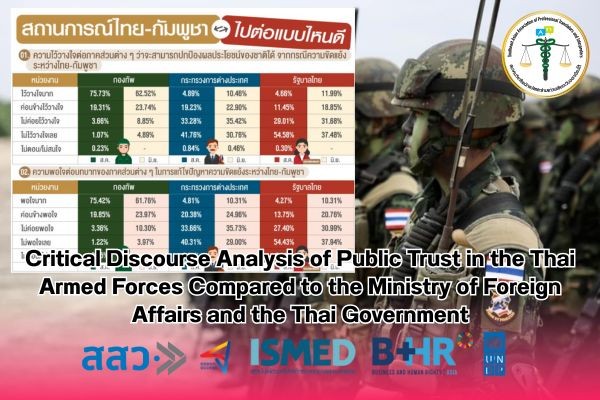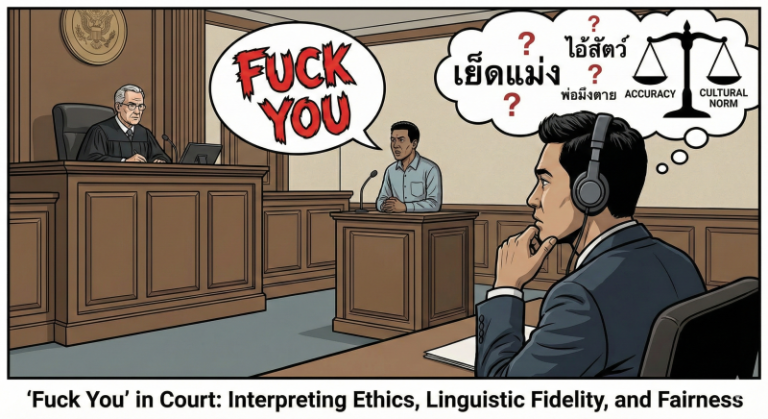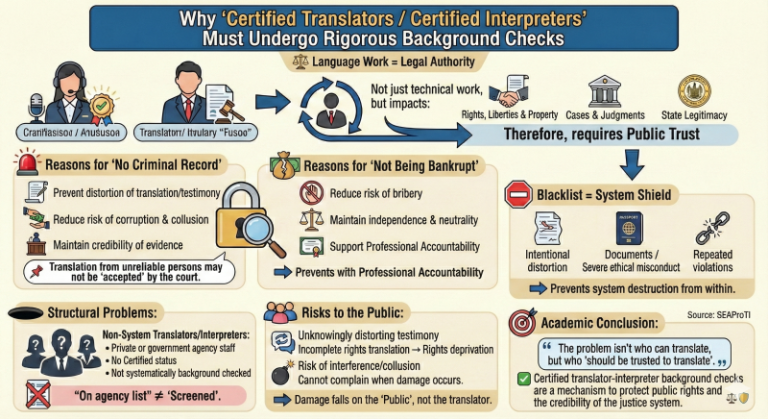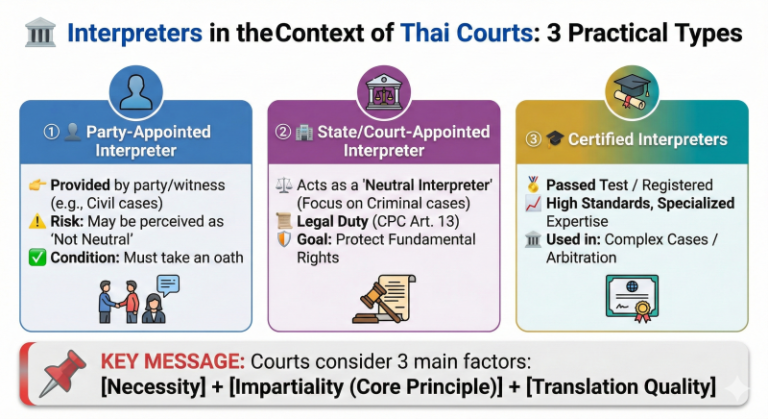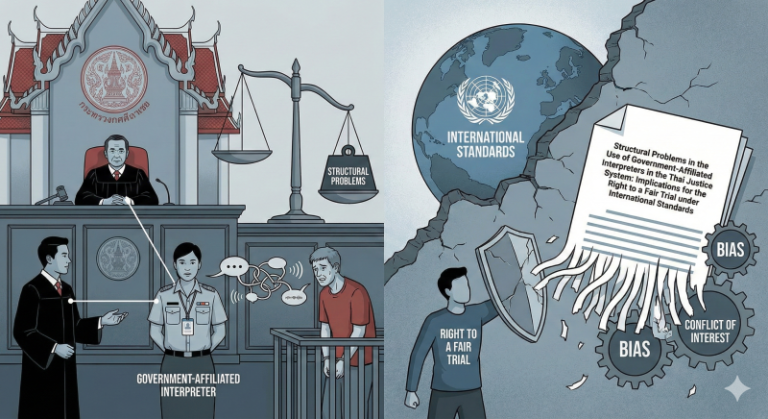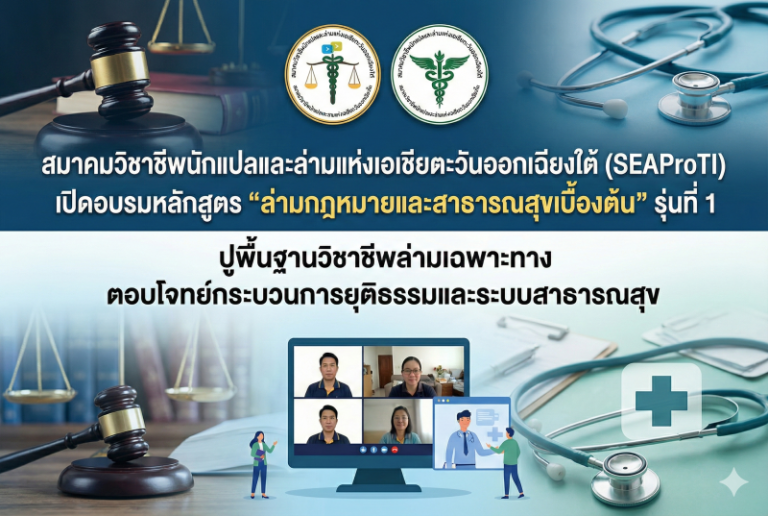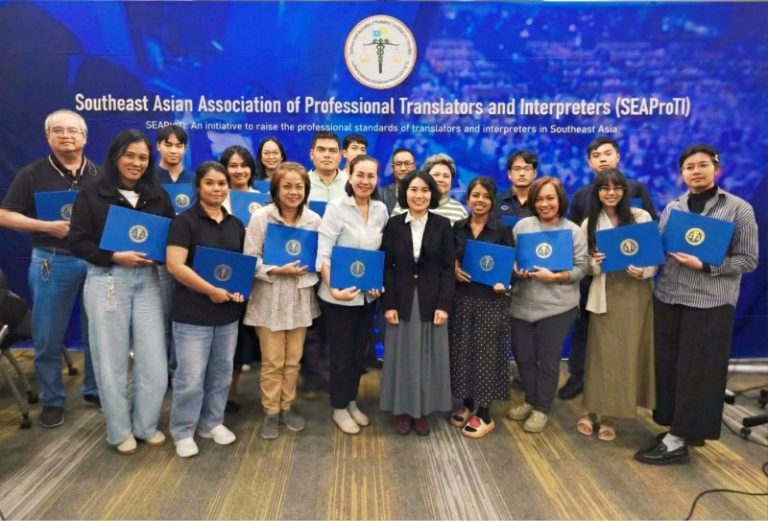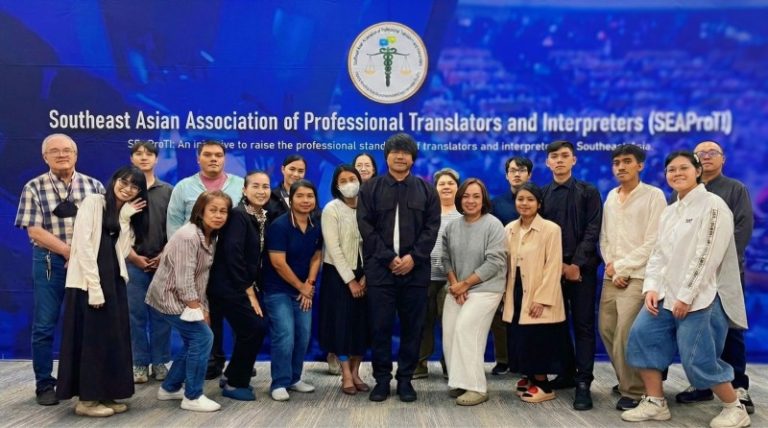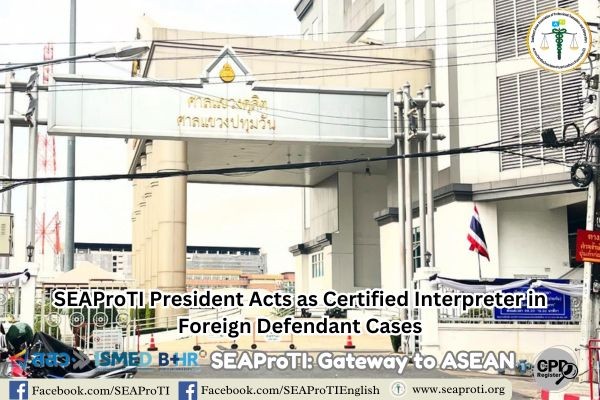Critical Discourse Analysis of Public Trust in the Thai Armed Forces Compared to the Ministry of Foreign Affairs and the Thai Government
Author: Wanitcha Sumanat, President of the Southeast Asian Association of Professional Translators and Interpreters (SEAProTI)
August 13, 2025, Bangkok – The public opinion survey conducted by the National Institute of Development Administration (NIDA Poll) on August 4–5, 2025, revealed that the Thai public has significantly greater trust in the armed forces compared to the Ministry of Foreign Affairs and the government. Specifically, 75.73% of respondents expressed “high trust” in the military, while 41.76% reported “no trust at all” in the Ministry of Foreign Affairs, and more than 83% expressed distrust in the Thai government (NIDA Poll, 2025). This disparity reflects the interrelationship between power structures, public communication, and public confidence during times of crisis.
Conceptual Framework and Methodology
This article adopts the framework of Critical Discourse Analysis (CDA), as developed by Fairclough (1995), which examines how language and discourse function to construct and maintain power. The analysis focuses on three dimensions: Text – analyzing the wording and linguistic features used in communication; Discursive Practice – analyzing the production, dissemination, and interpretation of information; Social Practice – analyzing the structural and power relations embedded in the discourse.
Findings from the Discourse Analysis
Constructing the Military’s Image as the Protector of the Nation
The military employs language and framing that emphasize security and the defense of national sovereignty, especially in the context of the Thai–Cambodian border conflict. This communication strategy creates public perceptions of the military as an active and effective actor in handling threats. This aligns with Entman’s (1993) observation that news framing significantly influences public perception and belief.
Undermining the Credibility of the Ministry of Foreign Affairs and the Government
The poll results indicate that the Ministry of Foreign Affairs and the government are associated with political suspicion, such as the leaked audio conversation between the Prime Minister and the Cambodian leader. Some media outlets reported this extensively and framed it as “compromise that could jeopardize national interests” (PPTVHD36, 2025). This phenomenon demonstrates that the image of political institutions can be eroded through sustained negative communication.
The Reproduction of the “Trust in the Military” Discourse
Many media outlets highlight the military’s high popularity ratings without critically questioning its political role (Nation Thailand, 2025; Thai PBS World, 2025). This results in the repetitive reinforcement of the discourse portraying the military as a “trustworthy institution,” consistent with van Dijk’s (2008) argument that the media plays a key role in sustaining institutional power.
Comparison with International Cases
The phenomenon of higher public trust in the military than in civilian governments is common in many countries, particularly in contexts of conflict or political crisis:
- Egypt, 2013 – Following weeks of protests against President Mohamed Morsi, the military, led by Abdel Fattah el-Sisi, overthrew the civilian government. Many citizens supported the move, believing the armed forces would restore stability (Kirkpatrick, 2013).
- Pakistan, 1999 – General Pervez Musharraf staged a coup d’état against Prime Minister Nawaz Sharif after a political crisis and corruption allegations. A significant portion of the public viewed the military as more professional and better equipped to manage governance than civilian leaders (Rizvi, 2000).
- Myanmar, 1988–1990 – Following the 8888 Uprising and the collapse of the Burma Socialist Programme Party (BSPP) government, the military (SLORC) seized control. Some citizens believed the armed forces could restore order and stability, though they were later heavily criticized (Steinberg, 2010).
- Turkey, 1980 – The Turkish military, under General Kenan Evren, carried out a coup claiming the need to stop political violence and left–right conflicts. Initially, the takeover was accepted by the public as a means of safeguarding national security (Harris, 1988).
- Chile, 1973 – The military, led by General Augusto Pinochet, ousted President Salvador Allende amid economic and political crises. A segment of the population supported the move, hoping it would restore stability and resolve economic problems (Constable & Valenzuela, 1991).
These cases demonstrate that trust in the military often surges when civilian governments lose credibility, with the military perceived as the “remaining option” for crisis resolution.
Conclusion
The higher level of public trust in the Thai armed forces compared to the Ministry of Foreign Affairs and the government results from a combination of security-oriented discourse, the erosion of political legitimacy, and the repetitive reinforcement of pro-military sentiment in the media. CDA reveals that language and communication not only reflect public opinion but also play a decisive role in shaping and sustaining trust in certain institutions. Moving forward, restoring public confidence in the government and civilian agencies will require transparent, responsive communication strategies that address public concerns directly and effectively.
References
- BBC. (2006, September 20). Thais back coup leaders. BBC News. https://news.bbc.co.uk/2/hi/asia-pacific/5360992.stm
- Constable, P., & Valenzuela, A. (1991). A nation of enemies: Chile under Pinochet. W. W. Norton & Company.
- Entman, R. M. (1993). Framing: Toward clarification of a fractured paradigm. Journal of Communication, 43(4), 51–58. https://doi.org/10.1111/j.1460-2466.1993.tb01304.x
- Fairclough, N. (1995). Critical discourse analysis: The critical study of language. Longman.
- Harris, G. S. (1988). The role of the military in Turkey in the 1980s: Guardians or decision-makers? In M. Heper & A. Evin (Eds.), State, democracy, and the military: Turkey in the 1980s (pp. 177–200). Walter de Gruyter. https://doi.org/10.1515/9783110830031.177
- Kirkpatrick, D. D. (2013, July 3). Army ousts Egypt’s president; Morsi is taken into military custody. The New York Times. https://www.nytimes.com/2013/07/04/world/middleeast/egypt.html
- McCargo, D. (2015). Mapping Thailand’s political domain. Critical Asian Studies, 47(3), 305–322. https://doi.org/10.1080/14672715.2015.1050133
- Nation Thailand. (2025, August 10). Thais trust army more than govt in border dispute: Poll. Nation Thailand. https://www.nationthailand.com/news/general/40053832
- NIDA Poll. (2025, August 6). ความคิดเห็นของประชาชนต่อการแก้ปัญหาความขัดแย้งชายแดนไทย–กัมพูชา. สถาบันบัณฑิตพัฒนบริหารศาสตร์. https://nidapoll.nida.ac.th/survey_detail?survey_id=764
- PPTVHD36. (2025, August 9). โพลเผยคนไทยเชื่อมั่นกองทัพมากที่สุดในวิกฤตชายแดน. PPTVHD36. https://www.pptvhd36.com/news/การเมือง/254582
- Rizvi, H. A. (2000). Military, state and society in Pakistan. Palgrave Macmillan.
- Steinberg, D. I. (2010). Burma/Myanmar: What everyone needs to know. Oxford University Press.
- Thai PBS World. (2025, August 10). Thais more confident in army than government in border dispute handling. Thai PBS World. https://world.thaipbs.or.th/detail/58513
- van Dijk, T. A. (2008). Discourse and power. Palgrave Macmillan.
About Certified Translators, Translation Certification Providers, and Certified Interpreters of SEAProTI
The Southeast Asian Association of Professional Translators and Interpreters (SEAProTI) has announced the criteria and qualifications for registration as “Certified Translators,” “Translation Certification Providers,” and “Certified Interpreters” of the Association under Sections 9 and 10 of the Royal Gazette, Secretariat of the Cabinet, Prime Minister’s Office of the Kingdom of Thailand, dated July 25, 2024, Volume 141, Part 66 Ngor, p. 100. Full text available at: The Royal Thai Government Gazette
SEAProTI is the first professional association in Thailand and Southeast Asia with a formal certification system for Certified Translators, Translation Certification Providers, and Certified Interpreters.
Head Office: Ban Ratchakhru Building, 33 Room 402, Soi Phahonyothin 5, Phahonyothin Road, Phaya Thai Subdistrict, Phaya Thai District, Bangkok 10400, Thailand
Email: hello@seaproti.com
Tel.: (+66) 2-114-3128 (Business hours: Mon–Fri, 9:00–17:00)
การวิเคราะห์วาทกรรมเชิงวิพากษ์ (Critical Discourse Analysis) ต่อความไว้วางใจของประชาชนที่มีต่อกองทัพไทยมากกว่ากระทรวงการต่างประเทศและรัฐบาลไทย
ผู้เขียน วณิชชา สุมานัส นายกสมาคมวิชาชีพนักแปลและล่ามแห่งเอเชียตะวันออกเฉียงใต้
13 สิงหาคม 2568, กรุงเทพมหานคร – ผลสำรวจความคิดเห็นของสถาบันบัณฑิตพัฒนบริหารศาสตร์ (NIDA Poll) เมื่อวันที่ 4–5 สิงหาคม 2568 สะท้อนว่าประชาชนไทยมีความไว้วางใจต่อกองทัพในสัดส่วนสูงกว่ากระทรวงการต่างประเทศและรัฐบาลอย่างมีนัยสำคัญ โดยร้อยละ 75.73 แสดงว่า “ไว้วางใจมาก” ต่อกองทัพ ขณะที่กระทรวงการต่างประเทศมีสัดส่วน “ไม่ไว้วางใจเลย” ถึงร้อยละ 41.76 และรัฐบาลไทยมีผู้ไม่ไว้วางใจมากกว่าร้อยละ 83 (NIDA Poll, 2025) ความแตกต่างนี้เป็นประเด็นที่สะท้อนความสัมพันธ์ระหว่างโครงสร้างอำนาจ การสื่อสารสาธารณะ และความเชื่อมั่นของประชาชนในภาวะวิกฤต
กรอบแนวคิดและวิธีการวิเคราะห์
บทความนี้ใช้แนวคิด Critical Discourse Analysis (CDA) ตามแนวทางของ Fairclough (1995) ซึ่งมุ่งศึกษาว่าภาษาและวาทกรรมมีบทบาทในการสร้างและคงไว้ซึ่งอำนาจอย่างไร โดยเน้นสามระดับการวิเคราะห์ ได้แก่ Text (ข้อความ) – วิเคราะห์ถ้อยคำและภาษาที่ใช้ในการสื่อสาร Discursive Practice (การปฏิบัติทางวาทกรรม) – วิเคราะห์การผลิต เผยแพร่ และตีความข้อมูล Social Practice (การปฏิบัติทางสังคม) – วิเคราะห์โครงสร้างและความสัมพันธ์ทางอำนาจที่แฝงอยู่
ผลการวิเคราะห์วาทกรรมเชิงวิพากษ์
1. การสร้างภาพลักษณ์ของกองทัพในฐานะผู้พิทักษ์ชาติ
กองทัพใช้ถ้อยคำและกรอบความหมาย (framing) ที่เน้นความมั่นคงและการปกป้องอธิปไตย โดยเฉพาะในบริบทความขัดแย้งชายแดนไทย–กัมพูชา ทำให้ประชาชนรับรู้ว่ากองทัพเป็น “ผู้ลงมือ” และ “มีประสิทธิภาพ” ในการจัดการภัยคุกคาม การสื่อสารลักษณะนี้สอดคล้องกับข้อสังเกตของ Entman (1993) ว่าการกำหนดกรอบข่าว (framing) มีผลต่อการรับรู้และความเชื่อของสาธารณะ
2. การลดความน่าเชื่อถือของกระทรวงการต่างประเทศและรัฐบาล
ผลโพลสะท้อนว่ากระทรวงการต่างประเทศและรัฐบาลถูกผูกโยงกับข้อสงสัยทางการเมือง เช่น กรณีคลิปเสียงสนทนาระหว่างนายกรัฐมนตรีกับผู้นำกัมพูชาที่รั่วไหล ซึ่งสื่อมวลชนบางส่วนรายงานอย่างเข้มข้นและตีความในเชิง “การประนีประนอมที่อาจกระทบผลประโยชน์ชาติ” (PPTVHD36, 2025) ปรากฏการณ์นี้ชี้ให้เห็นว่า ภาพลักษณ์องค์กรการเมืองสามารถถูกบั่นทอนผ่านการสื่อสารเชิงลบอย่างต่อเนื่อง
3. การผลิตซ้ำของวาทกรรม “ความไว้ใจทหาร”
สื่อหลายสำนักมุ่งเน้นตัวเลขความนิยมสูงของกองทัพโดยไม่ตั้งคำถามเชิงวิพากษ์ต่อบทบาทของทหารในทางการเมือง (Nation Thailand, 2025; Thai PBS World, 2025) ทำให้เกิดการผลิตซ้ำของวาทกรรมที่กองทัพคือ “สถาบันที่น่าเชื่อถือ” ซึ่งสอดคล้องกับการวิเคราะห์ของ van Dijk (2008) ว่าสื่อมีบทบาทสำคัญในการรักษาอำนาจเชิงสถาบัน
การเปรียบเทียบกับกรณีต่างประเทศ
ปรากฏการณ์ที่ประชาชนไว้วางใจกองทัพมากกว่ารัฐบาลพลเรือนพบได้ในหลายประเทศ โดยเฉพาะในบริบทความขัดแย้งหรือวิกฤตการเมือง
- อียิปต์ ปี 2013 – หลังการประท้วงต่อต้านประธานาธิบดี Mohamed Morsi นานหลายสัปดาห์ กองทัพนำโดย Abdel Fattah el-Sisi ได้โค่นรัฐบาลพลเรือน โดยมีประชาชนจำนวนมากสนับสนุนเพราะมองว่ากองทัพจะนำเสถียรภาพกลับคืนมา (Kirkpatrick, 2013)
- ปากีสถาน ปี 1999 – พลเอก Pervez Musharraf ทำรัฐประหารโค่นนายกรัฐมนตรี Nawaz Sharif หลังวิกฤตการเมืองและข้อกล่าวหาทุจริต ประชาชนจำนวนมากมองว่ากองทัพมีความเป็นมืออาชีพและสามารถแก้ปัญหาการบริหารได้ดีกว่าผู้นำพลเรือน (Rizvi, 2000)
- เมียนมา ปี 1988–1990 – หลังการลุกฮือ 8888 และความล้มเหลวของรัฐบาลพรรค BSPP กองทัพ (SLORC) เข้าควบคุมประเทศ โดยมีชาวบ้านบางส่วนเชื่อว่ากองทัพจะสามารถจัดการความวุ่นวายและฟื้นฟูความสงบ แม้ต่อมาจะถูกวิจารณ์อย่างหนัก (Steinberg, 2010)
- ตุรกี ปี 1980 – กองทัพตุรกีภายใต้การนำของนายพล Kenan Evren ทำรัฐประหาร โดยอ้างว่าต้องหยุดยั้งความรุนแรงทางการเมืองและความขัดแย้งระหว่างฝ่ายซ้าย–ขวา ซึ่งในช่วงแรกได้รับการยอมรับจากสังคมในฐานะผู้รักษาความมั่นคง (Harris, 1988)
- ชิลี ปี 1973 – กองทัพภายใต้การนำของนายพล Augusto Pinochet โค่นรัฐบาล Salvador Allende ท่ามกลางวิกฤตเศรษฐกิจและการเมือง ประชาชนบางส่วนสนับสนุนเพราะหวังว่าจะฟื้นฟูเสถียรภาพและแก้ไขปัญหาเศรษฐกิจ (Constable & Valenzuela, 1991)
กรณีเหล่านี้แสดงให้เห็นว่าความเชื่อมั่นในกองทัพมักพุ่งสูงในสถานการณ์ที่รัฐบาลพลเรือนสูญเสียความน่าเชื่อถือ และกองทัพถูกมองว่าเป็น “ตัวเลือกที่เหลืออยู่” ในการจัดการวิกฤต
บทสรุป
การที่ประชาชนไว้วางใจกองทัพไทยมากกว่ากระทรวงการต่างประเทศและรัฐบาล เป็นผลลัพธ์ของการผสมผสานระหว่างวาทกรรมความมั่นคง การบั่นทอนภาพลักษณ์ทางการเมือง และการผลิตซ้ำความเชื่อโดยสื่อมวลชน การวิเคราะห์เชิง CDA ชี้ให้เห็นว่าภาษาและการสื่อสารไม่เพียงสะท้อนความคิดเห็นของประชาชน แต่ยังมีบทบาทสำคัญในการสร้างและคงไว้ซึ่งความเชื่อมั่นในสถาบันบางประเภท ในอนาคต การฟื้นฟูความเชื่อมั่นต่อรัฐบาลและหน่วยงานพลเรือนจำเป็นต้องพิจารณายุทธศาสตร์การสื่อสารที่โปร่งใสและตอบสนองต่อข้อกังวลของสาธารณะอย่างตรงไปตรงมา
เอกสารอ้างอิง
- BBC. (2006, September 20). Thais back coup leaders. BBC News. https://news.bbc.co.uk/2/hi/asia-pacific/5360992.stm
- Constable, P., & Valenzuela, A. (1991). A nation of enemies: Chile under Pinochet. W. W. Norton & Company.
- Entman, R. M. (1993). Framing: Toward clarification of a fractured paradigm. Journal of Communication, 43(4), 51–58. https://doi.org/10.1111/j.1460-2466.1993.tb01304.x
- Fairclough, N. (1995). Critical discourse analysis: The critical study of language. Longman.
- Harris, G. S. (1988). The role of the military in Turkey in the 1980s: Guardians or decision-makers? In M. Heper & A. Evin (Eds.), State, democracy, and the military: Turkey in the 1980s (pp. 177–200). Walter de Gruyter. https://doi.org/10.1515/9783110830031.177
- Kirkpatrick, D. D. (2013, July 3). Army ousts Egypt’s president; Morsi is taken into military custody. The New York Times. https://www.nytimes.com/2013/07/04/world/middleeast/egypt.html
- McCargo, D. (2015). Mapping Thailand’s political domain. Critical Asian Studies, 47(3), 305–322. https://doi.org/10.1080/14672715.2015.1050133
- Nation Thailand. (2025, August 10). Thais trust army more than govt in border dispute: Poll. Nation Thailand. https://www.nationthailand.com/news/general/40053832
- NIDA Poll. (2025, August 6). ความคิดเห็นของประชาชนต่อการแก้ปัญหาความขัดแย้งชายแดนไทย–กัมพูชา. สถาบันบัณฑิตพัฒนบริหารศาสตร์. https://nidapoll.nida.ac.th/survey_detail?survey_id=764
- PPTVHD36. (2025, August 9). โพลเผยคนไทยเชื่อมั่นกองทัพมากที่สุดในวิกฤตชายแดน. PPTVHD36. https://www.pptvhd36.com/news/การเมือง/254582
- Rizvi, H. A. (2000). Military, state and society in Pakistan. Palgrave Macmillan.
- Steinberg, D. I. (2010). Burma/Myanmar: What everyone needs to know. Oxford University Press.
- Thai PBS World. (2025, August 10). Thais more confident in army than government in border dispute handling. Thai PBS World. https://world.thaipbs.or.th/detail/58513
- van Dijk, T. A. (2008). Discourse and power. Palgrave Macmillan.
เกี่ยวกับนักแปลรับรอง ผู้รับรองการแปล และล่ามรับรองของสมาคมวิชาชีพนักแปลและล่ามแห่งเอเชียตะวันออกเฉียงใต้
สมาคมวิชาชีพนักแปลและล่ามแห่งเอเชียตะวันออกเฉียงใต้ (SEAProTI) ได้ประกาศหลักเกณฑ์และคุณสมบัติผู้ที่ขึ้นทะเบียนเป็น “นักแปลรับรอง (Certified Translators) และผู้รับรองการแปล (Translation Certification Providers) และล่ามรับรอง (Certified Interpreters)” ของสมาคม หมวดที่ 9 และหมวดที่ 10 ในราชกิจจานุเบกษา ของสำนักเลขาธิการคณะรัฐมนตรี ในสำนักนายกรัฐมนตรี แห่งราชอาณาจักรไทย ลงวันที่ 25 ก.ค. 2567 เล่มที่ 141 ตอนที่ 66 ง หน้า 100 อ่านฉบับเต็มได้ที่: นักแปลรับรอง ผู้รับรองการแปล และล่ามรับรอง
*สมาคมวิชาชีพนักแปลและล่ามแห่งเอเชียตะวันออกเฉียงใต้ เป็นสมาคมวิชาชีพแห่งแรกในประเทศไทยและภูมิภาคเอเชียตะวันออกเฉียงใต้ที่มีระบบรับรองนักแปลรับรอง ผู้รับรองการแปล และล่ามรับรอง
สำนักงานใหญ่: อาคารบ้านราชครู เลขที่ 33 ห้อง 402 ซอยพหลโยธิน 5 ถนนพหลโยธิน แขวงพญาไท เขตพญาไท กรุงเทพมหานคร 10400 อีเมล: hello@seaproti.com โทรศัพท์: (+66) 2-114-3128 (เวลาทำการ: วันจันทร์–วันศุกร์ เวลา 9.00–17.00 น.)


